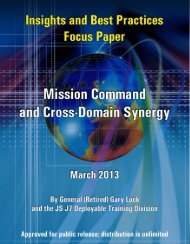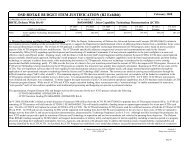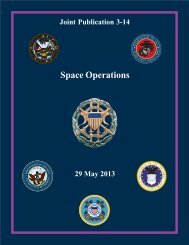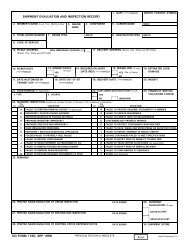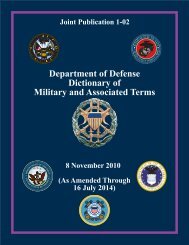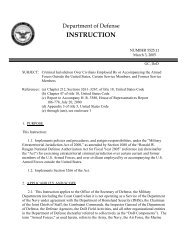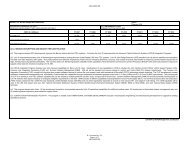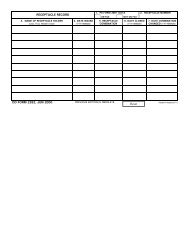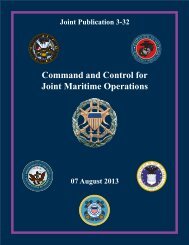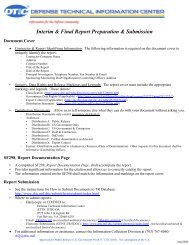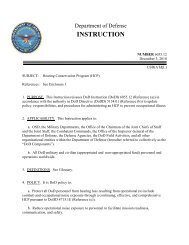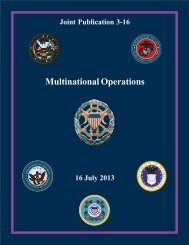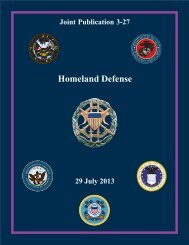JP 1, Doctrine for the Armed Forces of the United States - Defense ...
JP 1, Doctrine for the Armed Forces of the United States - Defense ...
JP 1, Doctrine for the Armed Forces of the United States - Defense ...
Create successful ePaper yourself
Turn your PDF publications into a flip-book with our unique Google optimized e-Paper software.
Chapter II<br />
achieved through close, continuous interagency and interdepartmental coordination and<br />
cooperation, which are necessary to overcome discord, inadequate structure and procedures,<br />
incompatible communications, cultural differences, and bureaucratic and personnel<br />
limitations.<br />
(2) Unity <strong>of</strong> Ef<strong>for</strong>t Guidance. Within <strong>the</strong> USG, <strong>the</strong> NSS guides <strong>the</strong> development,<br />
integration, and coordination <strong>of</strong> all <strong>the</strong> instruments <strong>of</strong> national power to accomplish national<br />
objectives. The NSC is <strong>the</strong> principal policymaking <strong>for</strong>um responsible <strong>for</strong> <strong>the</strong> strategic-level<br />
implementation <strong>of</strong> <strong>the</strong> NSS. The NSC system is a process to coordinate executive<br />
departments and agencies in <strong>the</strong> effective development and implementation <strong>of</strong> those national<br />
security policies. This coordination sets <strong>the</strong> stage <strong>for</strong> strategic guidance provided to <strong>the</strong><br />
CCMDs, Services, and various DOD agencies and <strong>for</strong>ms <strong>the</strong> foundation <strong>for</strong> operational and<br />
tactical level guidance.<br />
(3) National Security Council. The NSC is <strong>the</strong> principal <strong>for</strong>um <strong>for</strong> consideration<br />
<strong>of</strong> national security policy issues requiring Presidential determination. The NSC advises and<br />
assists <strong>the</strong> President in integrating all aspects <strong>of</strong> national security policy—domestic, <strong>for</strong>eign,<br />
military, intelligence, and economic (in conjunction with <strong>the</strong> National Economic Council).<br />
Along with its subordinate committees, <strong>the</strong> NSC is <strong>the</strong> principal means <strong>for</strong> coordinating,<br />
developing, and implementing national security policy. The statutory members <strong>of</strong> <strong>the</strong> NSC<br />
are <strong>the</strong> President, Vice President, Secretary <strong>of</strong> State, and SecDef. The CJCS is <strong>the</strong> council’s<br />
statutory military advisor and <strong>the</strong> Director <strong>of</strong> National Intelligence is <strong>the</strong> council’s statutory<br />
intelligence advisor. Officials from <strong>the</strong> Office <strong>of</strong> <strong>the</strong> Secretary <strong>of</strong> <strong>Defense</strong> (OSD) represent<br />
SecDef in NSC interagency groups. Similarly, <strong>the</strong> CJCS, assisted by <strong>the</strong> Joint Staff,<br />
represents <strong>the</strong> CCDRs <strong>for</strong> interagency matters in <strong>the</strong> NSC system. O<strong>the</strong>r senior <strong>of</strong>ficials are<br />
invited to attend NSC meetings, as appropriate. Subcommittees <strong>of</strong> <strong>the</strong> NSC include:<br />
(a) NSC Principals Committee (PC). NSC/PC is <strong>the</strong> senior (cabinet-level)<br />
interagency <strong>for</strong>um <strong>for</strong> considering policy issues affecting national security.<br />
(b) NSC Deputies Committee (DC). NSC/DC is <strong>the</strong> senior subcabinet<br />
interagency <strong>for</strong>um <strong>for</strong> considering policy issues affecting national security. The NSC/DC<br />
prescribes and reviews <strong>the</strong> work <strong>of</strong> <strong>the</strong> NSC interagency groups, helps to ensure that issues<br />
brought be<strong>for</strong>e <strong>the</strong> NSC/PC or <strong>the</strong> NSC have been properly analyzed and prepared <strong>for</strong><br />
decision, and oversees day-to-day crisis management and prevention.<br />
(c) NSC Interagency Policy Committees (IPCs). The main day-to-day<br />
<strong>for</strong>um <strong>for</strong> interagency coordination <strong>of</strong> national security policy, NSC/IPCs manage <strong>the</strong><br />
development and implementation <strong>of</strong> national security policies by multiple departments and<br />
agencies <strong>of</strong> <strong>the</strong> USG. NSC/IPCs provide policy analysis <strong>for</strong> <strong>the</strong> more senior committees <strong>of</strong><br />
<strong>the</strong> NSC system to consider and ensure timely responses to Presidential decisions. IPCs are<br />
grouped as ei<strong>the</strong>r regional or functional.<br />
(d) Regional NSC/IPCs. Regional NSC/IPCs may be established and chaired<br />
by <strong>the</strong> appropriate Under or Assistant Secretary <strong>of</strong> State with responsibility <strong>for</strong> regional<br />
issues (e.g., Europe and Eurasia, Western Hemisphere, East Asia).<br />
II-14 <strong>JP</strong> 1



